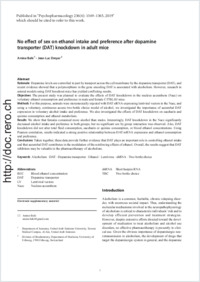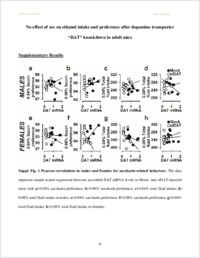No effect of sex on ethanol intake and preference after dopamine transporter (DAT) knockdown in adult mice
- Bahi, Amine Department of Anatomy, United Arab Emirates University, Tawam Medical Campus, Al Ain, United Arab Emirates
- Dreyer, Jean-Luc Division of Biochemistry, Department of Biology, University of Fribourg, Switzerland
-
01.04.2019
Published in:
- Psychopharmacology. - 2019, vol. 236, no. 4, p. 1349–1365
English
Rationale Dopamine levels are controlled in part by transport across the cell membrane by the dopamine transporter (DAT), and recent evidence showed that a polymorphism in the gene encoding DAT is associated with alcoholism. However, research in animal models using DAT knockout mice has yielded conflicting results. Objectives The present study was planned to evaluate the effects of DAT knockdown in the nucleus accumbens (Nacc) on voluntary ethanol consumption and preference in male and female C57BL/6J mice. Methods For this purpose, animals were stereotaxically injected with DAT siRNA-expressing lentiviral vectors in the Nacc, and using a voluntary, continuous access two-bottle choice model of alcohol, we investigated the importance of accumbal DAT expression in voluntary alcohol intake and preference. We also investigated the effects of DAT knockdown on saccharin and quinine consumption and ethanol metabolism. Results We show that females consumed more alcohol than males. Interestingly, DAT knockdown in the Nacc significantly decreased alcohol intake and preference in both groups, but no significant sex by group interaction was observed. Also, DAT knockdown did not alter total fluid consumption, saccharin or quinine consumption, or blood ethanol concentrations. Using Pearson correlation, results indicated a strong positive relationship between DAT mRNA expression and ethanol consumption and preference. Conclusions Taken together, these data provide further evidence that DAT plays an important role in controlling ethanol intake and that accumbal DAT contributes in the modulation of the reinforcing effects of ethanol. Overall, the results suggest that DAT inhibitors may be valuable in the pharmacotherapy of alcoholism.
- Faculty
- Faculté des sciences et de médecine
- Department
- Département de Médecine
- Language
-
- English
- Classification
- Biological sciences
- License
-
License undefined
- Identifiers
-
- RERO DOC 326936
- DOI 10.1007/s00213-018-5144-9
- Persistent URL
- https://folia.unifr.ch/unifr/documents/307930
Other files
Statistics
Document views: 102
File downloads:
- pdf: 308
- Supplementary material: 114

